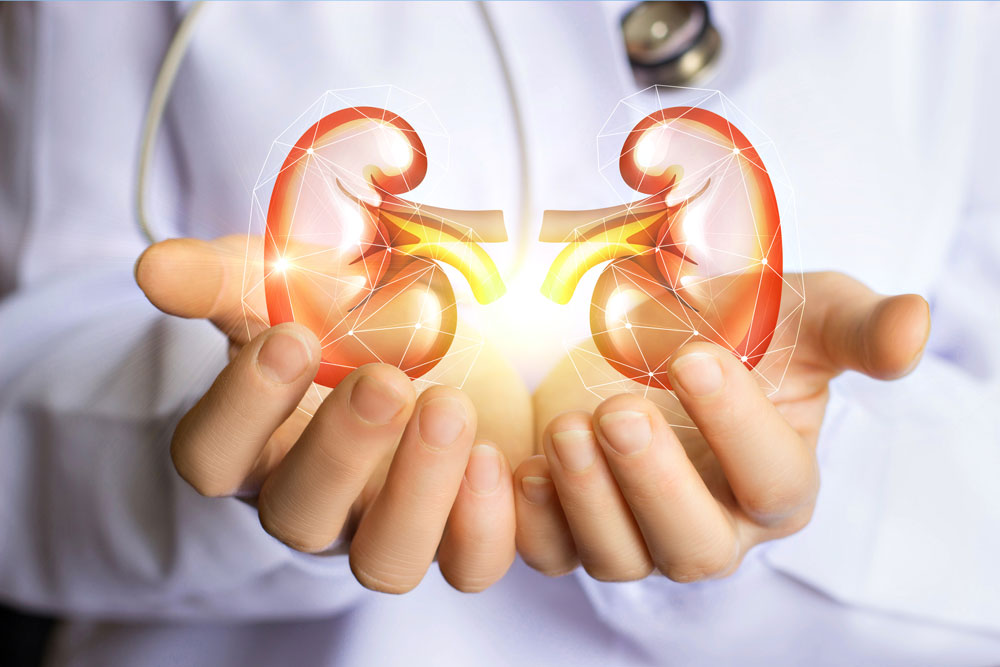Chronic Diseases during Ramadan
When Should Patients Break the Fast?

Fasting the month of Ramadan carries many health benefits on the human body and is an opportunity to detoxify it. Long hours of abstinence from eating are an opportunity to repair cells, adjust hormone levels, and promote the rate of burning fat stored by the body, which eventually contributes to the development of atherosclerosis.
Despite the great benefits of this holy month, there is a category of patients who are forbidden to fast, and another category that requires an intensive follow-up with the treating physician in order to keep the situation under control. We are talking about patients suffering from a chronic disease.
Patients suffering from diabetes or from a heart or kidney disease wonder about the possibility of fasting during this holy month. The doctors agree that they should deal with each patient according to his/her condition and overall health.
Diabetics and the Effects of Fasting

Diabetes is one of the most common chronic diseases. The majority of diabetics refuses the doctor’s advice not to fast during Ramadan and insists on doing so regardless of the results. But, are all diabetics prohibited from fasting?
Doctors agree that determining or not the fasting of a diabetic depends on the patient himself/herself in terms of the blood sugar level, the possibility of regulating it, the adopted treatment, etc. However, the most important thing is the intensive follow-up with the treating physician, informing the latter of the details of the situation, making sure that the blood sugar level is being checked five times a day, and breaking the fast immediately in case of severe hypoglycemia, even if it is iftar time soon.
It is also recommended that the diabetic delay the pre-dawn meal (suhur) that should include equal parts of carbohydrates, proteins, and vegetables or fruits, frequently drink water, avoid sugary drinks and sweets of all kinds, and not increase the dose of treatment without consulting the doctor.
How does fasting affect the diabetic?
During the long hours of fasting, the blood sugar level decreases, leading thus to a decrease of the insulin secretion and an increase of the level of glucagon, the hormone produced by the alpha cells of the pancreas in case of hypoglycemia; it raises the concentration of glucose in the bloodstream. Catecholamines, which are hormones produced by the adrenal gland, such as adrenaline, also increase, leading to the breakdown of glycogen which is used by the body to store energy and converted into glucose.
In type I diabetes, the pancreas may fail to increase the secretion of glucagon to face hypoglycemia. These patients have a low blood sugar level and do not produce enough insulin due to autonomic neuropathy.
In patients with severe insulin deficiency for long periods, fasting may lead to increased breakdown of glycogens and ketones, leading to an increase of blood sugar level and ketones.
During Ramadan, diabetics may experience low blood sugar levels due to low food intake. On the other hand, they may experience an increase of blood sugar levels by five times, possibly due to low dose of medicine and consumption of large amounts of sugar.
The patient may also suffer from dehydration and blood clotting due to the lack of fluid intake during fasting hours. High blood sugar levels may lead to increased urination, leading to an increased risk of dehydration. Blood clotting occurs due to increased coagulation factors and the lack of self-coagulation factors. Increased blood viscosity also leads to dehydration and blood clotting.
When is a diabetic prohibited from fasting?
Doctors do not treat patients with diabetes as one category regarding the fasting during Ramadan. There are three groups of patients. The first group includes high-risk diabetics who should never fast, such as uncontrolled type I diabetics and patients who were exposed before the onset of fasting to complications of diabetes, kidney patients, and uncontrolled type II diabetics who are being treated with insulin.
The second group includes medium-risk diabetics. This group can fast provided that necessary precautions are taken regarding the treatment and fasting system through consulting the treating physician, such as patients adopting a treatment and taking certain types of diabetes drugs such as long-acting insulin.
The third group includes low-risk diabetics who control their diet and take some types of oral treatments, which do not lead to low sugar during fasting.
The conditions in which diabetics are not allowed to fast are:
– Type II diabetes, especially in advanced stages, which results in nephropathy and other complications.
– Patients with a continuously unstable blood sugar levels, exceeding 300 mg/dL.
– Patients who depend on insulin and need 3 to 4 doses daily, or patients who use insulin pump.
– Pregnant or nursing woman with diabetes.
– Diabetics suffering from other diseases such as high blood pressure, heart or kidney diseases, gastric ulcers, etc.
– A diabetic patient who has had a diabetic coma shortly before Ramadan.
– Frequent decrease in blood sugar level in the last three months before Ramadan.
– Children with diabetes.
Golden tips for safe fasting
There is still a small group of diabetics who can fast provided that they follow the doctor’s advice and guidance in general and monitor the situation closely.
The most important tips to follow during Ramadan:
– Measuring the blood sugar level several times during the day. Doctors prefer about five times a day or just when the person feels the level of blood sugar is decreasing.
– Breaking the fast immediately in case of hypoglycemia or hyperglycemia, in other terms, if the blood sugar level is less than 70 mg/dL or more than 300 mg/dL. The symptoms of hypoglycemia are severe hunger with tremors, sweating and nervousness, rapid pulse, and heart palpitations.
– Avoiding dehydration when fasting by avoiding salty foods such as salted nuts and high-protein diets or meat, reducing the intake of caffeine-rich drinks and soft drinks, and not eating salty spices to avoid thirst.
– Eating moderately, and eating fiber-rich food because it is slow to absorb and slowly supplies the body with energy. Suhur meal should be delayed to avoid a reduction in the blood sugar level throughout the next day.
– Eating fast-absorbing carbohydrates when the blood sugar level is low, such as water with sugar, honey, fruit juice, or eating 3 to 4 tablets of glucose or 3 to 4 tablespoons of sugar, and eating carbohydrates afterwards.
– Having suhur a short time before dawn to reduce fasting hours and making sure it is rich in proteins, such as beans, because it helps fasting during the day without increasing blood sugar level.
– Exercising two hours after iftar and not during fasting hours because working out leads to the loss of a large amount of fluids.
– Drinking a lot of water from sunset to dawn to avoid thirst and dehydration during the day.
– Abstaining from sugary drinks and replacing them with low-sugar drinks.
– Avoiding carbohydrates and sugary and fatty foods at iftar because they increase sugar levels and weight.
– Eating a lot of vegetables because they are healthy and low-caloric.
Kidney Patients during Ramadan

Kidney patients are affected by their dietary pattern. Their condition may improve or worsen according to what they eat and drink. However, kidney patients are generally advised not to be exposed to high temperatures, avoid eating salty foods, use a cup to drink water so as not to increase the amount of fluids required, and should eat low-fat foods and less sweets.
Kidney stones are so common. People with kidney stones can fast provided that they drink plenty of fluids to avoid dehydration which may increase deposits and renal colic.
Patients with acute kidney failure are critically ill, and are prohibited from fasting until their kidneys improve and return to normal.
There are different stages of nephropathy in patients with chronic kidney disease. Patients with kidney disease of the third degree and above are not advised to fast because the kidneys at this stage are unable to retain body fluids, which may cause severe failure in their functions and lead to a significant kidney damage. However, fasting for a long time considerably reduces body fluids, and patients should consult the treating physician to know the extent of kidneys injury and the impact of fasting on them.
Dialysis patients who purify their blood three days a week can fast the rest of the week. The purifying process consists of giving the patient an intravenous solution, breaking thus the fast. In peritoneal dialysis, patients cannot fast because the dialysis solution contains nutrients.
In case of fasting, dialysis patients should be careful about the amount of water they drink after iftar (not more than 1 liter per day) in order to avoid its accumulation in the heart and lungs. However, peritoneal dialysis patients may drink two liters of water per day depending on the amount of fluid that comes out with the solution used during the purifying process.
Kidney transplant patients are advised not to fast because the transplanted kidneys are affected by the lack of fluids and because they have to take medicines regularly and at specific times. Also, the majority of these patients have a certain disease. In general, kidney patients have to be careful and not neglect the suhur in order not to let the body weaken.
When Are Kidney Patients Prohibited from Fasting?
Cases in which kidney patients are prohibited from fasting:
– Patients with kidney failure because their abstinence from drinking liquids for a long time may lead to severe complications. The issue here is not the ability to fast or not, but the problems that happen due to fasting.
– Dialysis patients and those who suffer from kidney cirrhosis. In case the cirrhosis causes renal failure, the person should abstain from fasting, especially if he/she resorted to dialysis.
– Kidney patients who have a heart problem or diabetes are also prohibited from fasting because they are vulnerable to strokes due to the lack of fluids that may cause blood viscosity.
Cases in which fasting is allowed but on conditions:
– People with kidney failure (first or second degree) and do not suffer from any other health problem provided that they follow up the kidney functions weekly. If the patient notices that the quantity of the urine is less than the usual, he/she should get examined because he/she may be vulnerable to dehydration. Breaking the fast is thus recommended.
– People with kidney infections that affect kidney functions and cause a failure of the first or second degree. The patient should be examined especially that that he/she needs antibiotics to treat the inflammation. Breaking the fast is recommended if the patient is suffering from severe pain and renal colic.
– People with kidney stones that are affecting the kidney functions means that there is a kidney failure. Breaking the fast is recommended if the patient has blood in the urine, lost the consciousness, or has severe renal colic.
Fasting is permitted for patients who have only sand-like particles in the urine provided that they drink plenty of water during iftar hours.
General pieces of advice for kidney patients during Ramadan
– Consult the treating physician specialized in kidney diseases and identify the steps to be followed when fasting.
– The patient should know how to behave in the event of dehydration during the day. Patients suffering from kidney diseases during Ramadan are often allowed to fast, but dehydration should be avoided because it may lead to severe damage of kidney functions.
– Continue to take regular medicines during the fasting period, obviously according to the instructions, and drink enough fluids.
– Consult the treating physician or the doctor specialized in kidney diseases to continue taking medicines such as diuretics which may lead to severe kidney damage in the event of dehydration, although mild.
Heart Patients during Ramadan

Studies indicate that fasting is beneficial for people with stable heart diseases. During the fasting hours, the body consumes substances accumulated in it, such as fat stuck to the walls of the blood vessels. This leads to its complete removal, and thus the blood flow increases in these vessels. The amount of oxygen and food arriving to the cells also rises up, increasing thereby the vitality and function of the cells.
Fasting does not adversely affect heart patients who have a stable condition and those who do not have frequent symptoms such as chest pain or difficulty in breathing. In most cases, it is beneficial because it reduces the amount of food and reduces smoking and stress, which reduces the general risks caused by heart diseases, and has a positive impact on the health of the heart patient.
The heart pumps blood to various organs of the body. The digestive system receives 10% of the blood, but when fasting, it relaxes and the heart stops pumping this amount. This helps improving the health of heart and angina patients who fast.
Fasting leads to the decomposition of damaged cells which are replaced by new and active cells. This increases the strength and the work of different functions of the body. That’s why, at the end of the fast, the person feels serene, more energetic, and with a pure body.
Fasting increases the body’s burning rate of fats and sugars, which leads to the reduction of cholesterol and weight gain, both of which increase the risk of heart diseases. It also helps detoxify the body and increases the secretion of the growth hormone that burns fat.
However, some heart patients are prohibited from fasting:
– Patients with frequent chest pain.
– Patients with myocardial insufficiency.
– Patients with malignant heart arrhythmias treated with medication.
– Cardiac patients who need to remain under observation within the hospital.
– Heart attack patients, especially those who had an attack a few weeks before the month of Ramadan.
– Heart surgery patients who cannot usually fast during the first six weeks following the surgery.
– Patients with a valve stenosis or severe inflammation of the valves.
– Patients taking anticoagulants.
A heart patient who is able to fast the month of Ramadan should follow these dietary tips:
– Eat vegetables and fruits daily, because they contain antioxidants beneficial for cardiovascular health.
– Avoid foods that contain saturated fats and eat healthy fats found in nuts and fish.
– Eat grilled fish at least twice a week.
– Avoid fried food and replace it with grilled food.
– Do not add salt and avoid salty food.
– Avoid canned and processed food because it contains a large amount of salt.
– Eat red meat and remove chicken skin before eating.
– Drink water regularly during iftar hours and avoid drinking large amounts at once.














